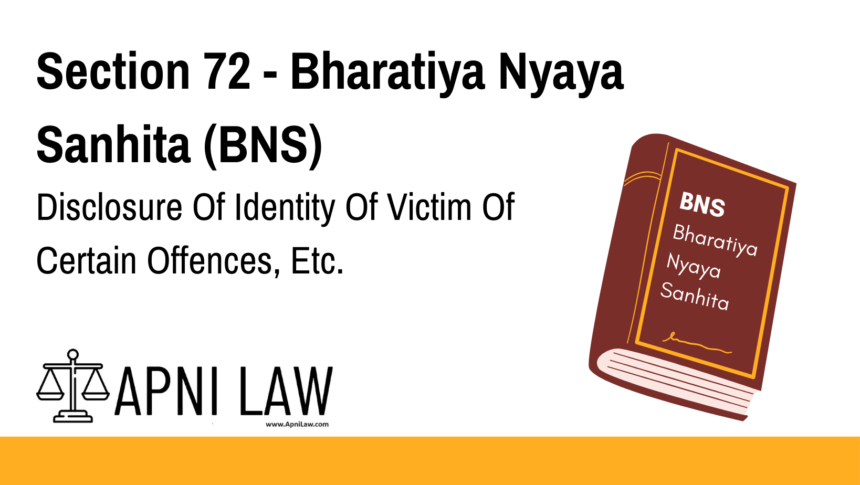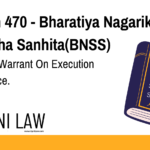Code: Section 72 BNS
(1) Whoever prints or publishes the name or any matter which may make known
the identity of any person against whom an offence under section 64 or section 65 or
section 66 or section 67 or section 68 or section 69 or section 70 or section 71 is alleged or
found to have been committed (hereafter in this section referred to as the victim) shall be
punished with imprisonment of either description for a term which may extend to two years
and shall also be liable to fine.
(2) Nothing in sub-section (1) extends to any printing or publication of the name or
any matter which may make known the identity of the victim if such printing or publication
is—
(a) by or under the order in writing of the officer-in-charge of the police station
or the police officer making the investigation into such offence acting in good faith for
the purposes of such investigation; or
(b) by, or with the authorisation in writing of, the victim; or
(c) where the victim is dead or a child or of unsound mind, by, or with the
authorisation in writing of, the next of kin of the victim:
Provided that no such authorisation shall be given by the next of kin to anybody other
than the chairman or the secretary, by whatever name called, of any recognised welfare
institution or organisation.
Explanation.—For the purposes of this sub-section, “recognised welfare institution
or organisation” means a social welfare institution or organisation recognised in this behalf
by the Central Government or the State Government.
Explanation of Section 72 BNS
1. Purpose of Section 72 BNS
This section is aimed at protecting the privacy and dignity of victims of serious sexual offences, ensuring that they are not subjected to further trauma through public disclosure.
2. Offences Covered Under This Section
This section applies to victims of the following offences:
- Section 63 BNS – Rape
- Section 64 BNS – Punishment for Rape
- Section 65 BNS – Rape of a Minor
- Section 66 BNS – Rape Leading to Death or Permanent Injury
- Section 67 BNS – Sexual Intercourse by Husband During Separation
- Section 68 BNS – Sexual Intercourse by a Person in Authority
- Section 69 BNS – Sexual Intercourse by Deceitful Means
- Section 70 BNS – Gang Rape
3. Punishment for Unauthorized Disclosure
- Imprisonment – Up to two years.
- Fine – Amount decided by the court.
4. Exceptions Under Section 72 BNS
- If the court permits disclosure for the benefit of the victim or in the interest of justice, the restriction does not apply.
Illustrations
Example 1: Media House Revealing a Victim’s Name
A newspaper publishes the name and photograph of a rape victim without court approval. This is a criminal offence under Section 72 BNS, and the media house can be punished with imprisonment and a fine.
Example 2: Social Media User Sharing a Victim’s Identity
A social media user posts details about a minor rape victim online. This act is punishable under Section 72 BNS.
Example 3: Court Permitting Disclosure for Rehabilitation
A court allows a victim’s identity to be revealed to facilitate government-sponsored rehabilitation. In such a case, Section 72 BNS does not apply.
Common Questions & Answers
1. Can a victim voluntarily disclose their identity?
Yes, but public disclosure by any third party without court approval is an offence.
2. Can a journalist report on the case without naming the victim?
Yes, journalists can report on sexual offence cases without revealing the victim’s identity.
3. Is sharing a victim’s identity in a private WhatsApp group illegal?
Yes, even sharing privately can be considered a violation, especially if it leads to public circulation.
4. What if the victim’s family discloses the identity?
Even the family members of the victim cannot disclose the identity without court permission.
5. What happens if a victim wants to come forward and speak about their case?
The victim has the right to share their story, but third parties still require court approval to disclose details publicly.
Conclusion
Section 72 BNS ensures that victims of serious sexual offences are not subjected to public humiliation or trauma due to unauthorized disclosure of their identity. The law strikes a balance between victim protection and legal proceedings.
For more legal updates, visit ApniLaw.








